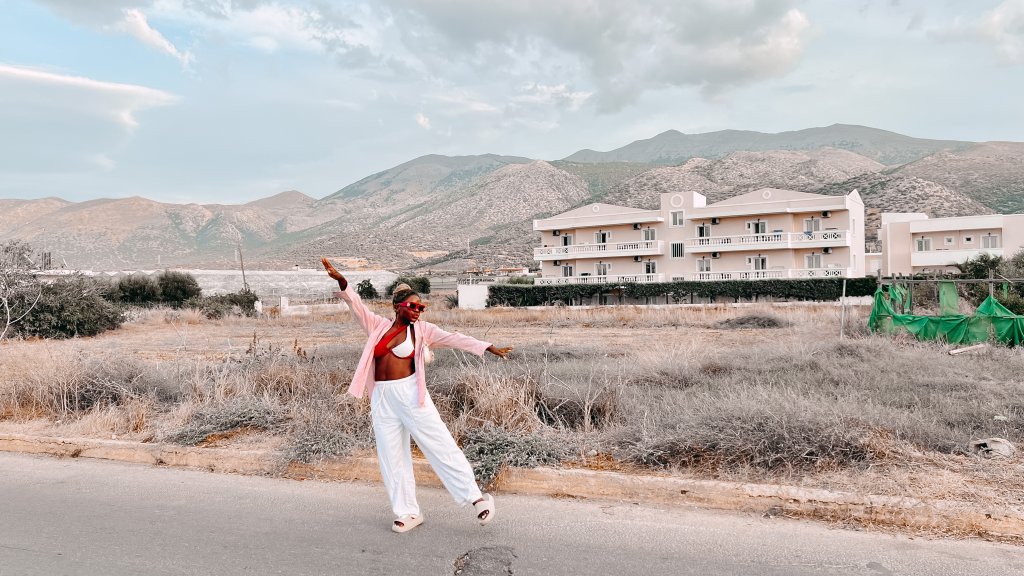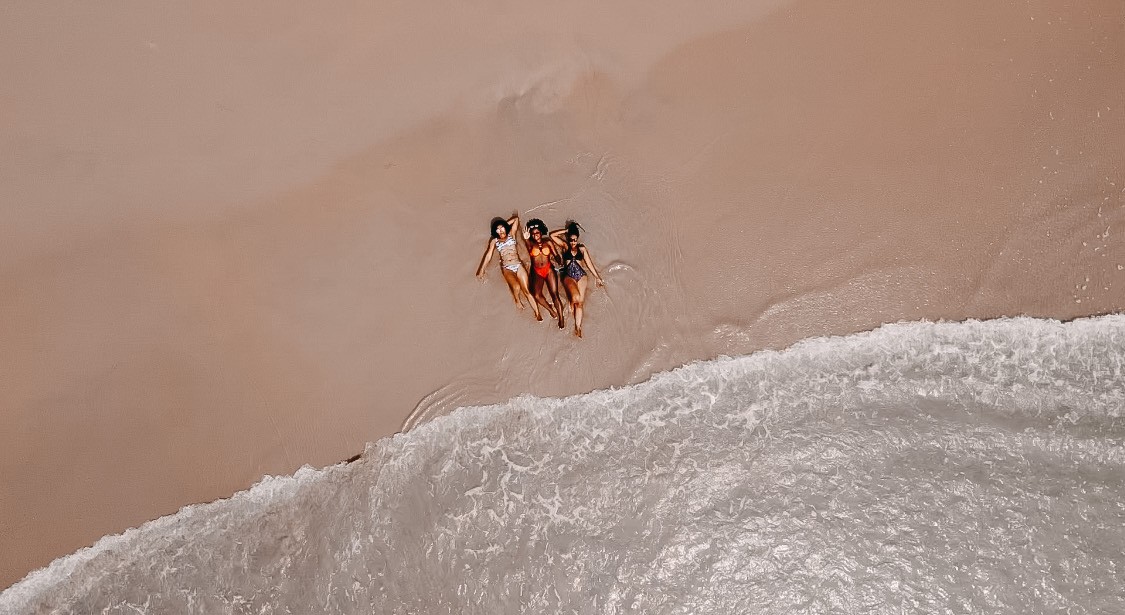At the tender age of 5, Tope Hassan was already signing her passport and eagerly waiting in line for her stamps – a foreshadowing of her remarkable journey into becoming a digital nomad. Raised in a missionary family, Tope’s upbringing was anything but ordinary. Her formative years were a whirlwind of travel across countries and continents. While most children might have chosen the comfort of a settled life, Tope’s insatiable wanderlust led her on a different path.
There’s a saying that “jobs fill your pockets, but adventures fill your soul.” For Tope Hassan, this couldn’t be truer. By day, she’s a product communication specialist; by night (and every other spare moment), she’s a globetrotter and travel content creator. Her life is a beautiful blend of the practical and the passionate, and today, she calls Paris her home, thriving in both worlds.
In the spirit of World Tourism Day, we’re thrilled to have Tope Hassan with us. This year’s theme, “Tourism and Green Investments,” is about responsible and sustainable tourism. It’s a call to action, reminding us that the benefits of travel should be both eco-friendly and sustainable. It’s an invitation to ponder how tourism can be a catalyst for positive change, a source of economic opportunities, a protector of natural and cultural treasures, and a bridge between people from diverse backgrounds.
With boundless enthusiasm, Tope is here to share her insights on how fellow adventurers and globetrotters can actively champion sustainability, aligning their journeys with this year’s theme. Her experiences and perspectives will open your eyes to the incredible travel possibilities beyond mere sightseeing.

“Travel has been an integral part of my life, with our stays in different countries sometimes as short as a couple of months or as long as five years.”

Tope Hassan and her love for being on the road
In the intricate tapestry of life, some individuals are born into extraordinary circumstances that shape not only who they are but also their profound impact on the world. Temitope Hassan embodies such a story with her roots firmly embedded in a missionary family. Her upbringing is a remarkable narrative that weaves together faith, exploration, and the transformative power of travel.
“I grew up in a missionary family and am proud to embrace that background. My dad is a pastor and a missionary who has had various careers, but currently, he serves as a missionary. I was born into a Christian and nomadic family, although my mom dislikes the term “nomad.” We travelled extensively from my earliest memories, often hopping on planes. I distinctly recall signing my passport for the first time when I was five. Travel has been an integral part of my life, with our stays in different countries sometimes as short as a couple of months or as long as five years.”
From her earliest memories, travel was a constant companion. Hopping on planes, traversing borders, and signing her passport for the first time at age five were the building blocks of her extraordinary life. The term “nomad” may not sit well with her mother, but for Temitope, it’s a badge of honour.
This nomadic lifestyle, a tapestry of diverse cultures, languages, and experiences, sculpted her into a cultural sponge, absorbing the world’s richness with every step. Her ability to seamlessly switch accents in conversation speaks volumes about her adaptability, a skill honed through years of traversing the globe.
“As a child, this nomadic lifestyle was ingrained in me. I had the privilege of meeting diverse people, learning various languages, and adapting to different cultures. This upbringing turned me into a cultural sponge, and my way of speaking can vary in accents from one conversation to the next. Being constantly on the move became second nature. While it may sound glamorous, the reality included experiences in countries with war, famine, and dangerous situations. This has given me a unique perspective and a calm resilience when facing challenges.”
As an adult, Tope Hassan wears many hats, including that of a PR specialist. Yet, her passion for travel remains unwavering. She’s not content with merely experiencing the world; she’s driven to share her adventures with the world through the lens of Instagram and social media. It’s a delicate balancing act, a testament to her unwavering dedication to what she believes in – the power of travel to enrich the soul.
“I’ve learned from my travels that it’s hard to confine yourself to one culture.”

Tope’s perspective of the world
Travel is a journey of self-discovery, an odyssey that transcends the boundaries of geography and culture. For Temitope Hassan, the world is a vast canvas of experiences, each destination a unique stroke of charm and fascination. Her reflections on her travels unveil the essence of her nomadic soul, a wanderer who has embraced the world’s myriad cultures and woven them into the very fabric of her being.
“I’ve been trying to pick a favourite experience, and it’s quite a challenge because every destination I’ve explored has its unique charm. Take Rwanda, for instance, with its vibrant dance culture and local cuisine deeply intertwined with its rich history. Then there’s France, where the culinary culture is a world of its own, and every corner carries layers of history. The French, with their distinct behaviours, stand out. Meeting Americans or Asians from various backgrounds, including Chinese culture, adds to the array of intriguing encounters.
I’ve learned from my travels that it’s hard to confine yourself to one culture. Well-travelled individuals tend to blend the cultures they’ve experienced, creating a unique fusion. For instance, my greetings draw inspiration from diverse cultures, and my favourite foods hail from Mediterranean cuisines like Italian. This cultural fusion often prompts questions about my origins because I’m no longer tied to one place; I’ve been inspired and transformed by people from various countries.
Rwanda holds a special place in my heart among the countries I’ve visited. It became my second home in high school when I participated in numerous student exchanges. The connections formed there are so profound that we consider each other family. Even though some live in different countries now, they remain an essential part of my life. This is the beauty of travel—you create new families across the world, ensuring you never run out of places to stay and people to cherish.”
Tope’s reflections take us on a journey beyond sightseeing and tourist attractions. They delve into the essence of travel—the profound connections we form, the rich tapestry of cultures we embrace, and the transformative power of the global human experience. Her words serve as a vivid reminder that in our shared world, the true beauty of travel lies in the relationships we cultivate and the cultures we carry within us.

Promoting sustainable and responsible travel
In a world where wanderlust often leads us to the far corners of the globe, Tope Hassan’s perspective on sustainability in travel emerges as a profound revelation. Her words remind us that the concept of sustainability transcends the mere boundaries of a destination; it is a guiding principle that should permeate every facet of our existence, including our travels.
“Sustainability isn’t just a trendy concept in travel; it’s a guiding principle that transcends our journeys and touches our daily lives. As a traveller, I’ve realised that sustainability isn’t confined to the places we visit—it’s an overarching philosophy that should shape our existence.”
One of the first things we must acknowledge is that, at this point, many aspects of the travel industry must be more sustainable. For instance, air travel is a significant contributor to environmental degradation. Even our beloved road trips, often powered by traditional gasoline engines, cast a long shadow of carbon emissions. And let’s not forget ships, which frequently rely on diesel engines—yet another unsustainable mode of transport. As travellers, we must admit we play a part in these environmental challenges.”
Tope’s tips on responsible and eco-friendly travel practices
Tope’s conscious choices remind us that sustainability begins with the decisions we make every day. It’s a testament to the power of individual choices in addressing global environmental challenges. “When it comes to my travels, I prioritise train travel whenever feasible. Electric trains have a significantly lower carbon footprint than air or road travel. In the realm of accommodations, I seek sustainable options incorporating eco-friendly practices. It’s a small choice that can make a big difference. I also opt for activities utilising electric or battery-powered alternatives, such as electric boat cruises, whenever available. Furthermore, I research and choose destinations and activities prioritising conservation and sustainable practices. During my travels, I avoid picking up seashells or interfering with natural habitats to protect biodiversity.”
Tope Hassan’s journey towards sustainability is not confined to her personal choices but extends to the very essence of conscious consumerism. Her approach to souvenirs and possessions goes beyond the mere act of acquiring trinkets; it is a practice steeped in mindfulness.
“As a consumer, I recognise the power of my choices in supporting companies with sustainable initiatives. I actively encourage and challenge businesses to adopt eco-friendly practices by providing constructive feedback and positive reviews. Additionally, I’ve undertaken research to identify and financially support organisations actively working on sustainable solutions, particularly within the travel industry.”

Prioritising meaningful experiences
Tope Hassan takes us beyond the typical tourist checklist in her quest for a more sustainable approach to travel. She reveals the secret to preserving popular destinations’ essence: prioritising experiences that truly resonate. By doing so, she minimises her impact and pays homage to the guidelines and cultural heritage of these places.
“I’ve consciously avoided attractions or experiences that exploit animals or contribute to environmental harm. Zoos and specific wildlife tours, for example, are practices I no longer support. Additionally, I’ve made careful decisions about activities and experiences, especially when they involve unsustainable practices.
Sustainability is a collective endeavour; even the most minor changes in our behaviour can lead to significant positive impacts. While it may not always be the most convenient path, it is undeniably necessary. We can actively contribute to a more environmentally friendly and responsible future by embracing sustainability in our personal lives and travels.”
The economic benefits of tourism in Nigeria
As a seasoned globetrotter, Tope Hassan is often sought out for travel advice, but her response might surprise you. When asked about visiting Nigeria, she offers a word of caution: “Don’t go unless you have a local to guide you.”
“Like many other nations, Nigeria needs the well-oiled machinery of tourism infrastructure in popular destinations. No gleaming tourism office offers neatly packaged itineraries, no user-friendly apps showcasing must-see sights, and no preserved landmarks with informative plaques. It contrasts the Eiffel Tower’s elegance or New York’s iconic skyline. However, it doesn’t have to be this way.”
In today’s world, where tourism is often associated with towering skyscrapers and extravagance, we overlook the intrinsic beauty of preserving cultural treasures. Tope Hassan believes we should look inward.
“So, here’s a radical idea for Nigeria: let’s preserve what we already have.”

“Tourism only sometimes requires grandeur and extravagance. Sometimes, it thrives in the simplicity of preserving cultural treasures. Take, for instance, Kenya, where travellers are drawn not to skyscrapers but to the timeless allure of the African bush, where nature has been crafting its attractions for thousands of years.
So, here’s a radical idea for Nigeria: let’s preserve what we already have. The National Stadium is a historical relic that could host events showcasing our rich heritage. Let’s turn selected areas of our bustling markets into cultural landmarks with displays of traditional artistry and craftsmanship. Imagine a Lagos Mainland Market transformed into a designated tourist zone where visitors can engage with local artisans and enjoy an authentic shopping experience.”
In addition, Tope Hassan thinks, “Our vibrant waterways can become another source of tourism revenue. Imagine leisurely boat rides through the heart of Lagos, offering breathtaking views of the city’s skyline. Tourists could soak in the scenery, passing landmarks like Tarkwa Bay while contributing to the local economy.
But it’s not just about attracting tourists; it’s about telling our stories. We mustn’t rely solely on outsiders to narrate our culture and history. We need Nigerian voices sharing the tales of Shango, Ogun, and countless others. Our heritage deserves to be recounted by those who have lived it.”
“Sustainability extends beyond tourism; it encompasses every aspect of our lives, including what we buy.”

The role of sustainable consumption
In a world brimming with products vying for our attention, the notion of sustainability transcends the boundaries of tourism, reaching deep into the heart of our daily lives. Here, our quote serves as a guiding light, advocating for supporting local markets during our travels and adopting a profound sense of mindfulness in our purchasing habits.
“I’m a staunch advocate for supporting local markets when I travel. It’s an opportunity to engage with communities and invest in products that resonate with our journey.
The concept of tourism is evolving. Travelers are now seeking experiences rather than just visiting famous landmarks. They want to connect with local cultures, savour authentic cuisines, and engage in activities that offer a deeper understanding of the destination.
To ensure this trend continues positively, travellers must respect local customs and rules when visiting foreign countries. It’s essential to embrace these differences rather than expecting everything to be like home. Cultural sensitivity should always be a priority.”

Advice for aspiring travellers
Travel is something best experienced firsthand. It’s like the notion that there are no mistakes in life, only lessons – some things are better understood through personal experiences. So, when it comes to travel, Tope’s advice is simple: Just do it.
“The future of travel looks promising, emphasising slower, more immersive experiences, remote work opportunities, and the use of technology to enhance the travel experience. Travellers will have more choices and resources, making it a travellers’ market. It’s also crucial that sustainability remains a focal point, with options like eco-friendly flights gaining popularity to minimise the environmental impact of travel.”
Tope Hassan’s journey from a nomadic childhood to a sustainable travel advocate is a testament to the transformative power of travel. Her experiences highlight the importance of responsible tourism and the need for individuals to make sustainable choices when exploring the world.
As we celebrate World Tourism Day with the theme “Tourism and Green Investment,” Tope’s insights serve as a valuable guide for travellers looking to impact the planet positively while embracing the beauty of diverse cultures and landscapes.

